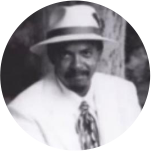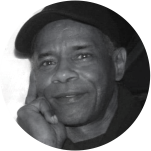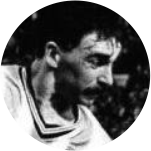Finding The First Copy with Ady Croasdell

It was sad to hear of the passing of Tony Middleton this week. It immediately brought back memories of our first Cleethorpes weekender in 1993. Here’s a photo of that trip and the sleevenotes reminscence from the Cleethorpes CD. L to R Tony, Brad Comer, me, Mary Love on the fire escape at Ace Records, Harlesden.
“There’s nothing like meeting and striking up a relationship with an act to get their full co-operation. I was given Tony Middleton’s number by soul sleuth Andy Rix, and was keen to get him on the first Cleethorpes Northern Soul weekender show as he was quite unknown as a live artist back then. He had a very strong Northern Soul recording history that would sound great live and hopefully draw in the customers. I was due to visit the States on a record-buying mission about six months before the show and arranged to meet up with Tony in a rather swanky Swedish restaurant that he had picked out. I immediately felt out of my depth when he turned up in a sharp suit and a leggy Swedish blonde, who evidently owned and hosted the joint, came up and greeted him as a personal friend. The prices didn’t make me feel any more at ease and the conversation was rather one-sided with Tony regaling me with all his achievements as a singer, actor and general man of the world. We got on well though and I think I probably upped my meagre offer for his fee just to save face: I really didn’t think he would go for it. However, he kindly said he would perform at our inaugural event because he liked me and it would be fun, even if the money was below his usual radar. I was extremely grateful and having got his word was happy to pay the sizeable bill and even throw in a tip to the Greta Garbo figure.
When Tony arrived in England, he was an easy-going and down to earth fellow who spent a memorable night out with myself, soul fan and DJ Val Palmer and a very colourful American punk rocker called Mike Spencer from the Cannibals group, who Tony teased by telling him that his Harlem gang used to kick Mike’s hoodlum friends’ asses all around Central Park. He also came round to tea at my friend and 100 Club doorman Winston’s house for a home-cooked goat curry and was a hoot in general. It was not until my next trip to New York when I visited his house in the Bronx and learned that he was a UPS driver by day that I realized he was not quite the blue-blood I had assumed; just a great guy who could mix with either the people or high society on equal terms. He repaid the price of that previous meal by introducing me to boxing legend Jake La Motta in a Manhattan bar; Tony acted as if Jake was his best buddy and he may well have been – you just couldn’t tell.
As the first live act to perform at the Cleethorpes weekender Tony delivered a terrific set of his unique material. It was gratifying to know we had been responsible for bringing to Europe the man who recorded ‘To The Ends Of The Earth’, ‘Spanish Maiden’ and ‘Paris Blues’ and for him to deliver them so well. Knowledge of soul acts was so sparse in those early internet days that most European soul fans were unsure as to whether Tony was a black or a white guy. His cultured voice, so influenced by the sophisticated New York City soul productions of that era, sounded magnificent in our authentic 60s dancehall.”
—————————————————————————————————————————-

It’ll be poignant to say goodbye to Cleethorpes after thirty years of arriving at the Beachcomber in early June.
Sylvia and I said goodbye to a four-year old Charlotte and a two-year old Will and drove up the A1 with a couple of boxes of amateurly-made passes for the 400 or so who had decided to trust our ability in putting on a soul weekend. The envelopes had scribble like “owes a fiver”, “paying in records”, “can’t remember if they’re coming” or “make sure this one coughs up” all over them. To make it more fun Willie Tee dropped out a few days before and we decided to give everyone a fiver refund to be fair. We were the only Northern weekender on anywhere; it was quite a gamble.
The Beachcomber owner came to reception to see how we were coping – barely was the answer. He saw the queue and said, don’t worry about the security deposits, let’s get them into the chalets and into the dance rooms.
Once inside the pressure lifted though dealing with DJs has never been a doddle and though we were facing a sizeable loss, the minute Mary Love started singing, I knew everything would be OK; what a performer.
There have been a thousand highlights and very few low points. We all have our own cherished memories, here are a few of mine.
Chalet parties – after the euphoria of the Sunday night crescendo – to know that the work was all over, we’d delivered and I could just enjoy myself was bliss. You could just wander around the camp and there were shenanigans going on all over the place. Pop into one for half an hour, move on and eventually crash out in our own gaff, thoroughly contented.
Rehearsals – after picking up the artists, getting them settled in their hotels and sharing a meal or two with them, it was great to get them in the rehearsal studios and find out if they could actually still sing and had learned all the words. It was a big ask for them, songs they had forgotten about were going to be performed to 1,000 fanatics – they wanted to get t right. They invariably did and seeing the joy on their faces at this symbiotic relationship with the musicians was a privilege.
The Friday night buzz when soul fans from around the world got to meet up again at the venue we had come to love (and was perfect for what we wanted). For many it was the only time they got together, living on, say, the south coast and being friends with Scottish folk would make this an annual reunion. It really did feel like a homecoming.
Sunday night finale – especially when co-DJing with Adam and later Mick; we pulled it out of the bag every time and always knew when to end. The heart-warming applause, followed by diving into the pool, fully clothed, was a huge reward; I lay back and let the warm water wash the stress away.
The Banks & Rimmer quiz – professional amateurism at its best. It took itself semi-seriously, rather like the whole weekend. Trying to understand what Dougie was saying, but so happy he was there.
Finally a few of the acts I’m most proud of Mary Love, Maxine Brown, Little Ann, Skullsnaps/Diplomats, Bettye Swann, Frank Dell, Barbara Lewis, Bettye Lavette, the Velvelettes, Sid & Hoagy, Spencer Wiggins and HB Barnum playing British Bulldog.
I’ve enjoyed the last three years or so as much as any – not caring if the place burnt down being a big part of it. Phil and Neil have done a great job (Carolyn Crawford and Ronnie McNeir were as good live acts as we ever had) and it’s been fun seeing them working while I socialise. Sadly the numbers are down and the venue is changing so it had to be the last but it’ll be a chance to say goodbye and remember three decades of soulful memories.
——————————————————————————————————————–

Dean Parrish; the finding of, and his 1st European performance.
A recent mod-revival book repeated the incorrect information from Wikipedia that Dean Parrish contacted Russ Winstanley in 2001 and he made his first trip to the UK to appear at Prestatyn that year.
What actually happened was that soul fan Andy Rix searched for Dean for many years before twigging that his real name was Philip Anastasi (which he had written songs under). He managed to contact Dean and interview him in New York by phone. Andy then kindly passed the details on to me and I visited Dean at his Staten Island home and persuaded him to come to sing at the 6TS Cleethorpes Weekender in 2003. This he did and it began a series of great performances that he gave across the UK and Europe in the ensuing years. Dean did appear at Presatyn, but that was in 2010. Andy deserves all the acclaim for finding Dean and the 6TS Rhythm ‘N’ Soul Club was the organisation that got him to appear in Europe. Ironically the book is dedicated to Randy Cozens – my close friend and partner who I formed the 6Ts with.
I know it’s on Wiki, but some research from knowledgeable people would have been good. Having said that, I was asked on the sequence of events of 6TS dances by the author who still got it wrong in the book.
I’ve only skimmed through a friend’s copy but found two other minor points which were wrong or misleading. I suggest a decent proof reader for any similar ventures.

————————————————————————————————————————————-
20/03/23
Ace Records Ltd is proud to announce the purchase of the Shrine label and Eddie Singleton’s independent productions.
To celebrate we have compiled an album of the very best dance recordings the label made in 1965 and 1966, primarily in Washington DC.
The business’s failure made this music incredibly hard to find for record collectors and Shrine is rightly known as the rarest soul label.
It is much more than that though. The music was made by some one of the original founders of Motown, Raynoma Liles Gordy and her Motown-schooled cousin Mike Ossman, New York music business luminaries Eddie Singleton and Harry Bass and the up-and-coming talents of Washington’s Keni St Lewis and Maxx Kidd. The acts included the hugely respected Ray Pollard and fellow New Yorker J.D. Bryant, talented and established Washington and Baltimore acts Eddie Daye & The Four Bars, Bobby Reed and the Enjoyables. Importantly, they discovered and developed the local talent of the area in the shape of the Cautions, Les Chansonettes, the Prophets and Shirley Edwards.
It took decades for UK Northern Soul fans to realise the significance of the label. It finally clicked for Stafford’s Top Of The World all-nighter DJs who searched out the incredibly hard to find later releases and played them to the cult-following of the rare soul scene. The scarcity was caused by Shrine pressing up a batch of fourteen future singles but only getting a handful released before they folded. The vast majority of the later releases were destroyed in a warehouse fire or simply binned as stillborn commercial failures.
Such was the scarcity that when the first Shrine compilations were issued in 1990, the Prophets tracks from Eddie Singleton’s master tapes were assumed to be unreleased – until Shrine sleuth Andy Rix later obtained one from a group member.
The music captures the exuberance of soul music in its peak years. The rhythms are pounding, the vocals soaring and the songs positive and cleverly composed. Undeniably Motown-influenced, they never copy others’ songs but feature the group harmonies of New York City on the Counts, Enjoyables and Prophets singles, while the Ray Pollard and J.D. Bryant tracks have that city’s big ballad soul sound. Les Chansonettes and the D C Blossoms are shimmering femme group sounds at their most tantalising.
The label produced soul in many shades but here we’ve concentrated on its in-house dance specialties. Don’t worry about the price-tags; just listen to that quality.
—————————————————————————————————————————————-

Chuck Jackson sadly passed away on 16th February, we look back at his career.
No artist has had more releases or titles issued on Kent records than Chuck Jackson. The first compilation was “Mr Emotion” Kent 033, issued in 1984. The sleevenotes were by Randy Cozens, who had done more than anyone to promote Chuck’s music since hearing it in London’s mod clubs in the 60s. Those great Wand recordings had been largely forgotten about by the 80s and this Kent LP, along with individual tracks featuring on compilations like “Club Soul”, put the recordings back in the spotlight, earning him a new generation of fans across the soul world.
Picking the sixteen tracks from his Wand output was nigh on impossible (we also included his one-off Dakar 45 ‘I Forgot To Tell You’ because of its excellence) due to the incredibly high standards of the Wand recordings. ‘I Keep Forgettin’’, ‘Tell Him I’m Not Home’, ‘I’m Your Man’, ‘I Just Don’t Know What To Do With Myself’, ‘Any Day Now’ and for the dancers ‘Hand It Over’, ‘Good Things’, and ‘Chains Of Love’ were all featured. That left gems like ‘Beg Me’, ‘Who’s Gonna Pick Up The Pieces’, ‘I Don’t Want To Cry’, ‘I Wake Up Crying’ and more to be filtered onto Various Artist compilations.
Not long after the LP’s release I got to visit the Wand tape vaults in Nashville on behalf of Kent. On those reels we found unreleased songs like ‘I’d Be A Millionaire’, ‘Forget About Me’, ‘Castanets’, ‘Little By Little’, ‘What’s With This Loneliness’ and ‘I Can’t Stand To See You Cry’, which gave us cause to issue a second album in 1987 – “A Powerful Soul”.
The 90s saw the switch to CDs and Kent took the opportunity to release all Chuck’s original Wand LPs – two per CD – including his duets with label-mate Maxine Brown. The two Kent solo vinyl LPs were reconfigured into the 24 track CD “Good Things” – essentially his Best Of Wand. That CD saw the first public appearance of ‘What’s With This Loneliness’ which was picked up by modern soul DJs and has proved to be one of the most emotive numbers for many of Chuck’s fans.
Though the Wand-era Jackson had been very well-represented on Kent, some further tape vault discoveries, as late as 2017, turned up more unissued gem. Those included an early duet with Dionne Warwick called ‘Anymore’, a terrific version of Curtis Mayfield’s ‘Need To Belong’, the perky ‘Things Just Ain’t Right’ and six other previously unheard tracks. These were combined with alternate versions of ‘Hand It Over’ and ‘Forget About Me’, some mono takes of classic Wand releases that we’d only issued in stereo before and a handful of unreleased (on digital) B sides to form “Big New York Soul” Kent CDKEND 465 in 2017.
Chuck first sang with the Del Vikings vocal group as early as 1957. He had solo releases on Clock (under his real name Charles Jackson), Atco and Beltone shortly before signing to Wand. After his momentous years there, he was signed to Motown, where despite high hopes, he failed to make much of an impression. He did have two decent R&B hits though with ‘Are You Lonely For Me Baby’ and ‘Honey, Come Back’ in 1969. The Dakar one-off failed to sell and he was next to record for ABC. They managed to get him back in the charts with the superb dance track ‘I Only Get This Feeling’ and again with ‘I Can’t Break Away’ in 1973. All Platinum had some success with ‘I’m Needing You, Wanting You’ in 1975, but it was the release of their LP track ‘I’ve Got The Need’ that created a dancefloor smash in the UK; among Northern Soul fans in particular.
A reunion with Scepter’s Florence Greenberg (credited as Boss Lady) in 1979 at Channel records failed to get ‘When The Fuel Runs Out’ into the R&B charts but ‘I Wanna Give You Some Love’ for EMI America the following year did chart; his final entry.
There was a single on Sugar Hill in 1981 and then nothing until 1989 when UK producer Ian Levine got him back into the studios. That final vinyl number was a memorable one – ‘All Over The World’ – a soulful disco number that was widely admired and saw good sales. 1997 saw a duet with his old stablemate Dionne Warwick for the CD single ‘If I Let Myself Go’ for Wave Entertainment. They also released the solo ‘What Goes Round Comes Around’ on Chuck.
Throughout his career Chuck worked hard with his acclaimed live appearances and he continued to sing in great voice up until quite recently. He got a terrific reception at the Great Yarmouth soul weekender in 1990 and appeared around Europe on several occasions afterwards – as well as being in constant demand in his home country. I caught him at Nick Ashford and Val Simpson’s Sugar Bar nightclub in New York when I was accompanied by his sometime singing partner Maxine Brown – a truly memorable evening. Chuck’s voice was as magnificent as on the records we have cherished for decades and which have had such an impact on soul fan’s lives.
—————————————————————————————————————-
I was the first person to come across ‘Love Keeps Me Crying’ in the mid 80s when Ace/Kent got to visit the Scepter/Wand archives at King Records in Nashville. We found a lot of interesting unissued music including the master tape for both sides of a single by Walter Johnson (sic). One was a beautiful ballad called ‘Not Now, But Later’ that sounded very much like an Ashford and Simpson song, which would have been in keeping with Scepter’s Flomar publishing titles on the pair in that era.
I played ‘Love Keeps Me Crying’ on a made-up acetate at the 100 Club all-nighters of the late 80s and eventually issued it on CD in 1993. It became more popular in the early 2000s when both Butch and Mick Smith played instrumental versions from original acetates that had turned up. At some stage the coupling appeared in a Wand 45s listing as by Walter Wilson but as nobody had ever seen a copy of the record and both Scepter and Wand had several records listed that never made it to the pressing stage, I thought this must have been a mis-print.
In the meantime I had got to know the charming and talented Billy Jackson who had sung with the Revels and the Tymes and was an all-round Philly legend as writer, producer and anything else in-between. On my next trip to the States in the early 2000s, I visited him at his apartment and though we were mainly talking about possible licensing deals, he dug out a couple of piles of 45s from his cupboard to show me. I wasn’t expecting anything special as Billy was a guy who had been “got to” by UK dealers and collectors over the years. Philly was a pretty-well scoured record collecting area too with both US and UK dealers visiting regularly. So as I was flicking through a bunch of unsleeved singles of local productions and Cameo releases, I was a bit stunned to find a Wand 45 of Walter Wilson singing a song I’d played as an unissued gem for the past decade.
I of course asked Billy to get the disc in a decent sleeve and told him he had an item that would make him more money than a bunch of licensing deals in one go. Not being a full-time record dealer, at that time, I didn’t think I could get Billy the best price possible. It was a great record that he had produced and deserved something concrete from. I advised him the way to go about it and via my friend DJ Mick Smith we got record dealer John Anderson involved. He was able to get a much better price than I could have for it. Billy told me that Walter was a pseudonym for the very talented Tommy Keith whom I knew from his 1970s Vibration single and it later emerged that he had penned both sides of the 45 – the uptempo number co-written with Billy.
————————————————————————————-

My start in the record biz proper came when I suggested to Ace co-founder Ted Carroll at his Golborne Road record stall that I could compile a soul LP from the Kent/Modern catalogue Ace were currently working with. The resulting “For Dancers Only” record was the disc to be seen with in 1982 and went on to sell over 30,000 in its various guises. 97 more LPs were issued and in 1992 a series of CDs was started that is now around the 500 mark.
The Kent job entails finding and negotiating with the US label owners, tape research (and hopefully finding unissued gems), compiling the CDs, writing the sleevenotes and assisting with memorabilia for the artwork.
The last string to my ukelele was added in 1994 when I started the Cleethorpes Northern Soul Weekender, which is the scene’s longest-running event, annually attracting up to 1000 participants from all over the world and presenting some of the best 60s and 70s soul acts ever to appear in the UK. The 100 Club still packs them in and we are now into our 44th year. www.6ts.info.
Kent Records is in its 41st year and along with the rest of the music industry we are back to vinyl in an appreciable way – though the CD is the ideal format for the zealously documented histories of the great soul labels, producers, writers and acts.
Having reached my three score and ten last year, I have slowed down on the DJing and have a new 6TS partner, at the 100 Club, in Mattie Bolton who helps me make it through to 6am to play ‘Baby I Need Your Loving’ to an emotional crowd of dancing soul fanatics. Kent continues and there is no end to the projects, including a seemingly never-ending stream of great, previously unissued, recordings.



















